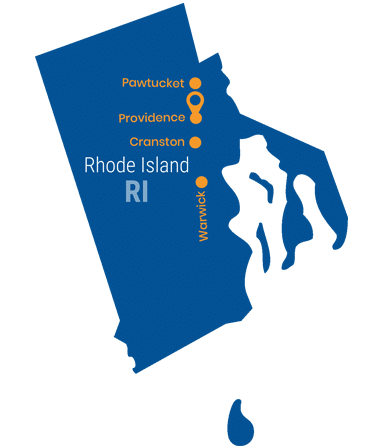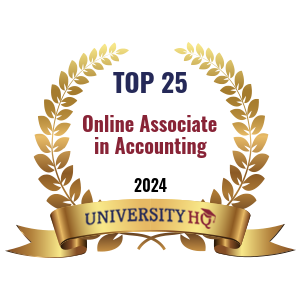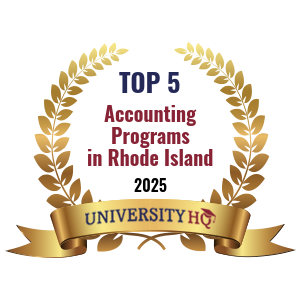What is Accounting?
Today's financial markets are largely driven by the work of accountants. Companies' executives, however, would lack the transparency they need to manage risk or plan projects if accounting is absent. Investors can't rely on timely and accurate financial information if accounting is absent. Accountants perform crucial functions for regulators as well, such as providing audit opinions on financial filings. Despite being overlooked sometimes, accounting is a critical component of modern finance.
Becoming a CPA in Rhode Island is similar to entering the profession in many other states. Rhode Island differs from many states in that CPA license renewal and continuing education reporting requirements are done every three years. To become a Certified Public Accountant you must first get your education path started, you can start with an online (AA) Associates degree with an accounting emphasis.

Featured Online Programs
Best Schools for Accounting in Rhode Island
Providence College
Score: 83.6
- Undergraduate Tuition
- In-State: $60,848
- Out-of-State:$60,848
- Net Price: $46,645
- Acceptance Rate: 49%
- Retention Rate: 91%
- Graduation Rate: 88%
- Total Enrollment: 4,635
- Undergrad Students: 4,191
- Graduate Students: 444
- Grads Salary: $83,000
- Student-to-faculty: 11:1
Bryant University
Score: 81.43
- Undergraduate Tuition
- In-State: $51,169
- Out-of-State:$51,169
- Net Price: $40,612
- Acceptance Rate: 66%
- Retention Rate: 87%
- Graduation Rate: 81%
- Total Enrollment: 3,592
- Undergrad Students: 3,240
- Graduate Students: 352
- Grads Salary: $86,000
- Student-to-faculty: 13:1
Salve Regina University
Score: 78.65
- Undergraduate Tuition
- In-State: $47,930
- Out-of-State:$47,930
- Net Price: $37,794
- Acceptance Rate: 70%
- Retention Rate: 85%
- Graduation Rate: 75%
- Total Enrollment: 2,836
- Undergrad Students: 2,117
- Graduate Students: 719
- Grads Salary: $81,000
- Student-to-faculty: 12:1
University of Rhode Island
Score: 76.34
- Undergraduate Tuition
- In-State: $16,408
- Out-of-State:$35,804
- Net Price: $20,964
- Acceptance Rate: 77%
- Retention Rate: 84%
- Graduation Rate: 71%
- Total Enrollment: 17,351
- Undergrad Students: 14,670
- Graduate Students: 2,681
- Grads Salary: $76,000
- Student-to-faculty: 17:1
Rhode Island College
Score: 71.81
- Undergraduate Tuition
- In-State: $10,986
- Out-of-State:$26,519
- Net Price: $11,549
- Acceptance Rate: 81%
- Retention Rate: 74%
- Graduation Rate: 46%
- Total Enrollment: 5,767
- Undergrad Students: 4,785
- Graduate Students: 982
- Grads Salary: $72,000
- Student-to-faculty: 14:1
Online Accounting Education in Rhode Island
To become a CPA in Rhode Island, you must have a bachelor’s degree and at least 150 credit hours of college credit. Your degree must come from a college or university with an accounting program accredited by an agency recognized by the United States Secretary of Education. At the undergraduate level, you must earn a minimum of 24 credit hours in accounting and 24 credit hours in business classes.
The course requirements include:
- Six credit hours in fundamental accounting
- Six credit hours in intermediate financial accounting and reporting
- Three credit hours in advanced financial accounting and reporting
- Three credit hours in auditing
- Three credit hours in tax accounting
- Three credit hours in business law
- Three credit hours in economics
Online Associates (AS)

An associate degree in accounting online generally takes two years to complete. The degree provides students with a base education in accounting and this is usually enough for a graduate to apply for and gain an entry-level position. These workers will deal with various parts of the accounting system, such as handling the accounts receivables or accounts payables portions of the business.
Online Bachelors (BS or BAcc)

Once you complete your bachelor’s degree in accounting online, you are on track to becoming a CPA. Accountants with bachelor’s degrees can complete the entire accounting system process but, unless they are CPAs, they will not be able to file reports with the SEC or defend clients to the IRS. An accountant without a CPA can move just as high as those with the certification, they simply follow a different path. After, or while, receiving your bachelor’s degree, you might consider gaining management certification or experience requirements in order to boost your resume.
Online Masters (MS or MAcc)

CPA candidates who wish to concentrate on a specific area of accounting might want to consider a master’s degree in accounting. Examples of these areas include managerial accounting, finance, or auditing. This degree can help accountants become managers or even transition into teaching. A master’s program in accounting usually takes 18 to 36 months depending on the program.
Online Doctorate (PhD)
For those who want to rise to the top of the accounting profession, a PhD is not necessarily the route to go. However, it is an excellent option for those who want to pursue teaching at a college or university. Doctorate degrees can take years to complete and include classroom education as well as either an exit exam or a dissertation and defense.
Online Degree in Accounting
For those who would prefer to get a degree online, these programs are becoming more easily available all over the world. Those interested in online learning can get a degree at any level through an online program. The courses are the same, but instead of having to go onto campus and sit in a classroom, students attend classes from their homes. This is more convenient for many people and is becoming increasingly popular, especially with students with jobs and familial responsibilities that are working on becoming a CPA.
Get our accounting resources and scholarships guidesRhode Island CPA Exam Requirements
Once you have received a bachelor’s degree and finished at least 120 credit hours of the 150 credit hours required, you may sit for the Uniform CPA Exam. Register online with CPA Exam Services (CPAES).
Send documentation and fees to CPAES at:
CPA Examination Services, Rhode Island Coordinator
P.O. Box 198469, Nashville, TN
37219-8469.
The Uniform CPA Exam consists of four sections: Auditing and Attestation, Regulation, Financial Accounting and Reporting and Business Environment and Concepts. You have four hours to complete each section of the exam, for a total of 16 hours. While you can take each section of the exam on a different date, you must complete the entire exam within 18 months of completing the initial section. You must pass each section with a score of at least 75.
- Residency requirement
To take the CPA Exam in Rhode Island, you must hold state residency or have a place of business or steady employment in the state. - Exam scheduling
CPA candidates will receive Notification to Schedule (NTS) from the National Association of State Boards of Accountancy (NASBA) by either email, fax or regular mail, depending on the selection in your application.
Testing centers for the Uniform CPA Exam in Rhode Island are in Warwick and Cumberland. Prometric handles exam scheduling for Rhode Island, so schedule your exam via their website. Arrive at the testing site at least half an hour before the test is scheduled to start. CPA candidates will receive exam scores in the mail.
Continuing Professional Education (CPE) Requirements
Rhode Island CPAs must complete 120 semester hours of Continuing Professional Education (CPE) every three years. That is the equivalent of 15 days of formal instruction over the time period, or five days annually.
The following subjects are approved by the Rhode Island Board of Accountancy for CPE credits:
- Auditing and accounting
- Management
- Consulting services
- Taxes
- Specialized knowledge and applications
- Regulatory ethics
- Behavioral ethics
Personal development and marketing courses may make up only 24 out of the total 120 credit hours during this three-year period. Self-study courses may not make up more than 80 out of the 120 CPE credit hours, while book or article publishing cannot exceed 60 out of the 120 CPE credit hours. Moderating or lecturing counts toward CPE credit, but not for more than 60 out of the 120 CPE hours. Such lecturing or moderating grants you two CPE hours per each hour of instruction.
You should keep records of your CPE for at least four years. You must renew your CPA license every three years, and you report your CPE hours at that time.
Make sure the following information is available:
- Attendance dates
- Course location
- CPE hours claimed
- Sponsoring courses and the organization
Become an Accountant in Rhode Island
Prior to receiving your CPA license, you must complete the professional accounting experience requirements. This paid accounting work experience consists of at least 1,820 hours of work over the course of a year and the supervision and verification of a licensed Certified Public Accountant CPA. Eligible experience includes working in private industry, public practice, education or government. The competencies you must prove vary according to the field in which you work.
Find Online Accounting Schools
Here are the current requirements:
- Education
- Instructor at an accredited university or college
- Teaching only upper level courses
- Using independent judgment and thought on non-routing accounting matters.
- Government – Federal, state or local
- Auditor or accounting job on the state level
- Auditor or accounting job at GS-7 level or above on the federal level
- FBI – special agent accountant
- Military – auditor or accountant
- Auditor or accountant for other governmental agencies.
- Public practice
- Using independent thought and judgment on various accounting matters
- Applying the proper technical and behavioral standards to the work.
- Private industry
- Tax return preparation
- Budgeting
- Tax return research
- Using accounting principles
- Cost accounting
- Preparation and analysis of financial statements
- Understanding the employer’s transaction streams and information systems
- Understanding the employer’s industry and competition
- Appraising the employer’s internal controls competency.
Besides these job-specific requirements, all CPAs must demonstrate certain core competencies.
These include:
- Documentation and work papers preparation
- Preparation and analysis of financial statements
- Understanding transaction systems and information systems
- Understanding how economic and regulatory trends affect business
- Development and analysis of critical success factors and performance measures
- Knowledge and understanding of the goals and objectives of different business entities
- Understanding the Rhode Island Board of Accountancy’s Code of Professional Conduct.
- Professional ethics course
Before you can begin your practical work experience, you must pass the home study “Professional Ethics Exam: The AICPA’s Comprehensive Course.” You must receive a score of at least 90 percent on this ethics exam to start your professional experience. When you apply for your CPA license, you must attach a copy of the completion certificate to the application.
Getting Your CPA License in Rhode Island
Once your educational requirements are complete, you pass the CPA Exam, and have completed the professional experience, you may apply for licensing in Rhode Island. Certified Public Accountant licensing in this state is also known as permitting. You must send official copies of your college transcripts and other supporting documentation, proof of passing the ethics test, and verification from your supervisory Certified Public Accountant of your work experience, along with a 2” x 2” photo of yourself and applicable fees to the Rhode Island Board of Accountancy online. If you must mail this information, this could delay your licensure for two to three months.
If you decide to go the mail route, send the package to:
Rhode Island Board of Accountancy
1511 Pontiac Avenue #68-1
Cranston, RI 02920.
-
Out-of-state CPA licenses
If you are already licensed as a Certified Public Accountant CPA in another state, you may be able to practice in Rhode Island as long as your CPA license comes from a “substantially equivalent” state, which currently includes all U.S. states and territories with the exception of the U.S. Virgin Islands. If you are a solo practitioner, you must receive a Rhode Island license. However, if your work for a practice organized as a business entity, only one member of the practice requires individual Rhode Island licensure if the other members all hold substantially equivalent licenses from other states. Keep in mind that Rhode Island firms may require state licensing by their employees.
You can apply for a reciprocal Certified Public Accountant certificate, which includes providing many of the requirements for standard Rhode Island licensing along with having the State Board in the state in which you are licensed send verification to the Rhode Island Board of Accountancy.
Potential Careers for Accounting Graduates
Rhode Island Average Accountant Salary
Rhode Island is such a small state that its employment and mean annual wage are combined with those of parts of Connecticut and Massachusetts. For the Providence-Warwick, RI-MA section, the mean annual wage is $50,600-$54,600, with an employment quotient of 8.48 per 1,000 people. In the Norwich-New London-Westerly, CT-RI area, the mean annual wage is $48,000 and an employment quotient of 4.53 per 1,000.
| City | Annual Median Wage |
|---|---|
| Providence | $50,600 |
| Warwick | $54,600 |
| Westerly | $48,000 |
| Entry Level | Mid Career | Late Career |
|---|---|---|
| $47,500 | $54,600 | - |
- Rhode Island Average Cost Estimator Salary: -
- Rhode Island Average Auditor Salary: $66,000
- Rhode Island Average Budget Analyst Salary: $59,000
- Rhode Island Average Credit Analyst Salary: $55,000
- Rhode Island Average Financial Analyst Salary: $59,000
- Rhode Island Average Personal Financial Advisor Salary: $40,500
- Rhode Island Average Tax Preparer Salary: $75,500
- Rhode Island Average Actuary Salary: $60,400
- Rhode Island Average Forensic Accountant
- Rhode Island Average Payroll and Timekeeping Clerk
Rhode Island Accounting Frequently Asked Questions
Is certification required?
Accountants that do not file reports with the Securities and Exchange Commission (SEC) are not required to be CPAs, but the certification is preferred by most businesses that hire accountants. A certified public accountant is in high demand, but you can earn a position as a bookkeeper, accountant, payroll supervisor, etc. without this certification.
Are there accounting jobs available in the state?
There are plenty of accounting jobs available in Rhode Island and nearby areas. According to Projections Central and the US Bureau of Labor and Statistics, accountant and auditor positions will continue to increase slightly between 2018 and 2028. It is anticipated that Rhode Island will have over 300 openings for accountants, but considering the size of the state, this could mean significant job opportunities. The best candidates will be CPAs or those with advanced degrees in accounting, financing, or business with a concentration in accounting.
How much can a person earn as an accountant in Rhode Island?
According to the US Bureau of Labor Statistics, accountants in Rhode Island have a median annual salary of $83,000. Of course, CPAs and accountants with an advanced degree have even higher earning potential.
Are there online degree options in the state of Rhode Island?
Yes, there are online degree options available in Rhode Island. Many schools are finding it easier to bring in students by offering either 100% online options, or at the very least, more flexible schedules with hybrid programing. Make sure you ask any prospective school to let you know what online options they have available so that you can take advantage of this flexible learning option.
Search All Programs






